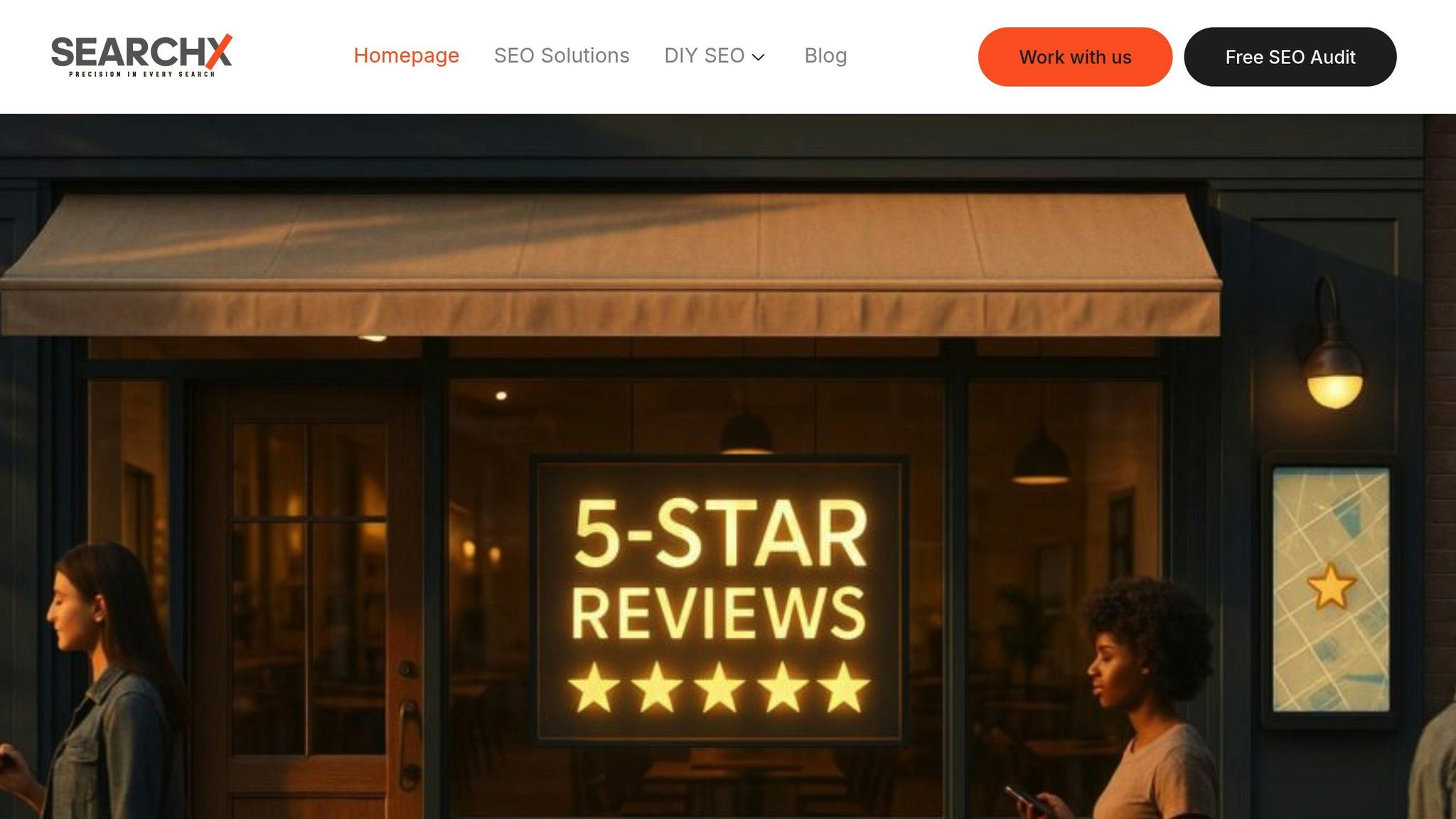SEO in Austin’s tech industry is evolving fast. With the city’s rapid growth as a tech hub, businesses must adopt smarter strategies to stay competitive. Here’s a quick snapshot of what’s driving SEO success in Austin today:
- Local SEO is critical: 46% of Google searches in Austin are for local services, and 76% of people who search locally visit a business within 24 hours.
- AI is reshaping SEO: Tools like machine learning and generative AI are helping businesses rank for hyperlocal keywords and optimize for voice search.
- Mobile-first strategies matter: Over 60% of searches are mobile, and a 1-second delay in load time can cut conversions by 20%.
- Voice search is growing: By 2024, 50% of searches are voice-based, requiring content tailored to natural, conversational queries.
- Neighborhood-specific trends: Austin’s unique neighborhood-driven search behavior demands hyper-targeted SEO approaches.
To succeed, Austin’s tech companies need to focus on Google Business Profile optimization, schema markup, and creating neighborhood-specific content. AI-powered tools and technical SEO audits are also proving essential for improving rankings and driving traffic. Whether you’re a startup or an established business, staying ahead in Austin’s competitive market means going beyond basic SEO tactics.
SEO Strategies for Your Business Growth in Austin,TX and Beyond
Main Trends Affecting SEO in Austin’s Tech Industry
Austin’s tech industry is pushing SEO strategies beyond traditional methods, driven by the city’s dynamic and forward-thinking approach. These trends are reshaping how businesses optimize for search engines, keeping Austin at the cutting edge of digital marketing.
AI and Machine Learning in SEO
Austin is one of 13 "early adopter" hubs for AI jobs, and this is already influencing SEO strategies in the city. Companies in the area are leveraging AI to automate content creation, enhance keyword research, and improve user experiences. Globally, 72% of companies now use AI in at least one business function, while 60% of U.S. firms are incorporating generative AI into marketing efforts, achieving up to four times the return on their investments.
In August 2025, Eye See You Now, a digital marketing agency based in Austin, showcased the potential of AI in SEO by significantly boosting clients’ online visibility and traffic. Their approach relied on machine learning to analyze vast datasets quickly, enabling more informed and strategic decisions compared to traditional methods.
"AI is no longer a futuristic concept; it is the engine powering modern search." – Eye See You Now
Generative Engine Optimization (GEO) is another game-changer in content creation. Agencies like Motiliti in Austin are using GEO to ensure their clients’ content aligns with AI-driven search algorithms. This involves predictive analytics, automated content generation, and advanced keyword strategies to stay ahead of emerging trends.
"The future of SEO with AI is not about replacing human creativity but amplifying it." – Eye See You Now
For businesses eager to adopt AI in their SEO efforts, tools like Surfer SEO offer scalable solutions starting at $79 per month. These advancements are paving the way for more localized and tailored strategies that resonate with Austin’s unique neighborhoods.
Local Search Focus and Targeted Strategies
Austin’s neighborhood-centric culture makes local SEO a key tactic for tech businesses. According to data, 76% of people who search for something nearby visit a related business within 24 hours, and 28% of those searches lead to a purchase.
During SXSW in August 2025, a local coffee shop optimized its Google Business Profile and targeted specific keywords, resulting in a 50% increase in foot traffic and a 30% boost in sales.
"Local SEO is not just a buzzword; it’s a critical component for Austin startups looking to thrive in this competitive landscape." – Fair Marketing
Another success story comes from an Austin-based landscaping company. By focusing on local events and neighborhood-specific keywords, they achieved a 40% increase in organic traffic and a 25% rise in customer inquiries within six months. With 85% of consumers valuing accurate contact details and operating hours, maintaining a detailed and updated Google Business Profile is essential for standing out in local searches.
For Austin businesses, incorporating city-specific phrases like "top SaaS startup in South Austin" or "AI solutions in Westlake Hills" into their content strategy can further enhance local visibility.
Voice Search and Conversational SEO
Voice search is becoming a major player in SEO as more consumers turn to conversational, natural-language queries. Over 58% of U.S. consumers have used voice search to find local businesses, and Austin’s tech-savvy population is leading the way in adopting these patterns.
"Voice searches are typically longer and more natural language-based than typed queries. Your content needs to anticipate these long-tail, question-based queries." – Sarah Miller, SEO Consultant
To capture this growing traffic, websites need to be mobile-friendly and fast-loading. Adding FAQ sections and schema markup can help search engines understand context, improving the chances of appearing in featured snippets – key for voice search results.
With major players like Google and Tesla contributing to Austin’s tech ecosystem, the city is becoming a hub for innovation that integrates AI across various business functions. These trends are not just reshaping SEO practices – they’re redefining the competitive landscape for businesses in Austin’s thriving tech scene. Staying ahead of these changes is no longer optional; it’s a necessity for success.
Challenges and Opportunities for Austin Tech Businesses
Austin’s tech scene is thriving, with over 7,000 new businesses emerging in 2024 and contributing to a staggering $187 billion GDP. This growth creates an exciting yet highly competitive environment for tech companies. Let’s explore the hurdles and opportunities that come with navigating this dynamic landscape.
Tackling High Competition in Austin’s Tech Industry
The fierce competition in Austin makes basic SEO tactics ineffective. With 46% of local searches focused on nearby services, businesses must go beyond generic strategies. Hyperlocal SEO, including long-tail keywords tailored to Austin’s unique interests, is now essential.
Take this example: In August 2025, a local Austin tech startup revamped its Google Business Profile and used hyperlocal keywords under the guidance of Marketing Manager Raj Tyagi. The result? A 34% boost in local search visibility and a 25% jump in foot traffic within just three months (Source: SearchX, 2025). Adding advanced tools like schema markup and localized landing pages further strengthens search engine relevance, helping businesses stand out in Austin’s crowded tech market.
Maintaining SEO During Rapid Startup Growth
Scaling quickly in a competitive city like Austin can complicate SEO efforts. To stay ahead, companies should weave technical SEO into every aspect of their operations – product development, content strategies, and even hiring. Regular audits and consistent performance tracking are critical to avoid missing opportunities during periods of expansion. These proactive steps ensure businesses remain agile and prepared to tap into Austin’s dynamic market.
Leveraging Austin’s Cultural and Demographic Diversity
Austin’s diverse population – 49% White, 34% Hispanic or Latino, 8% Black or African American, and 7% Asian – offers a unique opportunity for businesses to connect through culturally relevant SEO. By creating hyperlocal content and community-focused messaging, companies can align with neighborhood-specific search trends and foster greater engagement.
Voice search is also gaining traction, making it crucial to understand how different communities naturally speak and search online. Adapting to conversational queries and local language nuances can give businesses a competitive edge in driving localized traffic.
"In 2025, local SEO is less about ‘gaming’ the system and more about creating real digital relevance for your brand." – Brightter
This shift toward authentic, community-centered content is one of the most promising opportunities for Austin tech businesses. By embracing the city’s diversity and producing meaningful, culturally aware content, companies can not only improve their search rankings but also build stronger connections with the local community.
Practical SEO Strategies for Austin’s Tech Sector
Austin’s booming tech scene presents a unique challenge: standing out in an increasingly competitive market. To succeed, tech companies need SEO strategies that go beyond the basics. With many Austin websites falling short in Core Web Vitals, there’s a clear path for those willing to invest in smarter, data-driven optimization.
Optimizing for Local Search Results
Local SEO starts with a strong Google Business Profile. For Austin tech companies, this means crafting profiles that include accurate business details, consistent updates, and geotagged images to emphasize their connection to the city.
Using hyperlocal keywords is another game-changer. Instead of chasing broad, generic terms, focus on neighborhood-specific phrases that better align with local search intent. A great example? In 2025, Brightter helped an Austin-based client implement a location-specific landing page strategy. By creating pages tailored to different neighborhoods, they boosted local search traffic by 40% and saw a 25% increase in conversions within just three months.
Adding schema markup can also significantly improve local search visibility. By using LocalBusiness schema, tech companies can feed structured data directly to search engines, making it easier to appear in rich snippets and local pack results. These tactics lay the groundwork for a strong local presence.
Technical SEO Best Practices
Once local SEO is in place, technical SEO steps in to ensure everything runs smoothly. Think of it as the engine that keeps your site performing at its best. A key focus? Core Web Vitals. For Austin tech companies, this is a chance to gain a real advantage.
"Technical SEO isn’t just another marketing buzzword – it’s the foundation that determines whether your business thrives or disappears in search results." – Jason Duncan, Founder of Vincent Brand Go
Here’s proof: In early 2025, an Austin-based tech startup increased its organic traffic by a staggering 143% in just four months. How? By fixing canonical tags, resolving sitemap errors, and adding Product schema.
Mobile optimization is another must. With over half of all web traffic coming from smartphones, a mobile-first design isn’t optional – it’s essential. Adding specialized schema types like Product, FAQ, and Organization can further boost local authority. And don’t forget regular audits with Google Search Console. They’re invaluable for catching crawl errors and broken links before they harm your rankings. In fact, businesses with strong technical foundations have seen over 200% growth in "near me" searches.
Content Creation for Austin’s Tech Audience
Local and technical SEO are vital, but they’re only part of the equation. To truly connect with Austin’s tech community, your content needs to stand out. It should address the specific challenges faced by startups and businesses in the area.
"In 2025, local SEO isn’t just about adding your business to Google Maps and hoping for the best. The algorithms have evolved. Voice search is rising. AI is reshaping query intent." – Raj Tyagi, Author at Brightter
One way to do this is by incorporating FAQ sections that reflect real voice search queries. Questions like "How do I find reliable software developers in Austin?" not only capture voice-driven traffic but also provide valuable answers to potential clients.
Creating industry-specific content is another way to build authority. Discuss topics like navigating Texas regulations, working with local venture capital firms, or collaborating with nearby universities. Pair evergreen technical content with timely insights, and align your content calendar with major local events like SXSW or Austin Startup Week. This approach ensures your content stays relevant and visible year-round.
Tools and Resources for SEO Success in Austin
For Austin’s tech companies, having the right SEO tools is non-negotiable in one of the country’s fastest-growing markets. With 68% of online experiences starting with a search engine, it’s clear that effective SEO strategies are crucial. Agencies in Austin have reported up to 300% growth in organic traffic for high-growth clients. Below, we’ll explore the top tools and resources that help Austin-based businesses thrive in the SEO game.
Key Tools for Tracking and Optimization
Every successful SEO campaign starts with reliable tools for tracking and optimization – especially in a competitive market like Austin. One standout is SEMrush, which boasts a 4.6/5 rating on G2 from over 12,000 reviews. At $119.95/month, it provides essential features like keyword research and competitor analysis, making it a go-to for mid-sized companies.
For businesses focused on backlinks and site audits, Ahrefs is a strong contender at $99/month. Screaming Frog, priced at around $200/year, is ideal for in-depth technical audits. Meanwhile, Google Analytics, a free tool, pairs seamlessly with Google Search Console to track user behavior and site performance.
These tools deliver measurable results. In 2025, UppercutSEO helped a local Austin tech startup boost organic traffic by 150% in just three months by combining technical audits with content optimization. Similarly, Coalition Technologies showcased the power of comprehensive SEO strategies, driving substantial revenue growth for their clients.
"Our SEO efforts brought them up to an average of $300,000 a month in revenue." – Coalition Technologies
SearchX‘s Tailored SEO Solutions

SearchX offers customized SEO solutions designed to tackle the unique challenges faced by Austin’s tech companies. Their strategies focus on local SEO, technical audits, and SERP performance tracking, helping businesses stand out in a crowded local market.
Their keyword research service identifies hyperlocal opportunities, targeting neighborhood-specific phrases and industry-specific long-tail keywords that drive higher conversion rates. On the technical side, their SEO services address Core Web Vitals issues, ensuring fast and user-friendly websites.
The effectiveness of these approaches is backed by numbers. SEO leads have a 14.6% close rate, far surpassing the 1.7% close rate of outbound leads. Clients often see a positive ROI within 6–12 months, and in the B2B SaaS space, companies have achieved an average ROI of 702% from SEO efforts.
"A well-crafted digital marketing strategy can make the difference between the success and failure of your business." – Coalition Technologies
SearchX also provides link building services and local SEO guidance for businesses that prefer a hands-on or hybrid approach. Their SERP feature tracking tools monitor visibility across various search features, while their ROI measurement guide helps businesses quantify the impact of their SEO efforts.
Tool Features and Pricing Comparison
To choose the right tools, consider your company’s size, budget, and specific goals. Here’s a quick comparison to guide your decision:
| Tool/Service | Key Features | Monthly Pricing (USD) | Best For |
|---|---|---|---|
| SEMrush | Keyword research, competitor analysis | $119.95+ | Mid-size companies needing detailed data |
| Ahrefs | Backlink analysis, content gap tracking | $99+ | Startups focused on link building |
| Screaming Frog | Technical SEO audits, crawl analysis | ~$17/month* | Companies needing technical insights |
| Google Analytics | User behavior and conversion tracking | Free | All businesses (essential baseline) |
| SearchX Starter | Local SEO, content creation, GMB management | $3,000 | Small to mid-sized tech companies |
| SearchX Growth | Technical audits, competitor analysis | $6,000 | Scaling businesses ready to dominate |
| SearchX Enterprise | Full SEO management, AI visibility tracking | $12,000+ | High-growth brands with national goals |
*Approximately $200/year when billed annually.
Conclusion: Preparing for SEO Success in Austin’s Tech Future
Austin’s booming tech scene calls for a dynamic and forward-thinking SEO approach. With the city’s rapid growth and innovation, businesses face unique challenges – but also incredible opportunities to stand out.
Key Points and Next Steps
The numbers tell a compelling story about SEO in Austin: 61% of local SEO agencies report tech startups and SaaS companies as their fastest-growing client base. And those who nail their SEO strategies are reaping big rewards – like a 300% ROI achieved by one tech startup in just nine months using AI-powered programmatic SEO frameworks.
If you’re ready to take action, here’s where to start:
- Optimize your Google Business Profile: Include Austin-specific details to connect with local customers who rely on nearby search results.
- Use structured data and schema markup: These tools make your business details crystal clear to search engines. Many Austin businesses have seen traffic soar after implementing these strategies.
- Create Austin-centric content: Develop pages tailored to Austin’s unique vibe. Write about local tech events like SXSW, highlight neighborhood-specific keywords, and cover topics that resonate with the city’s culture.
"Local SEO is essential if you’re an Austin business. Improving your visibility in local search results can exponentially increase nearby customers and foot traffic." – Haydn Fleming, Chief Marketing Officer, 2POINT
By mastering these basics, you’ll be well-positioned to adapt to new trends and maintain long-term success.
Future-Proofing Your SEO Strategy
Once your local SEO foundation is solid, it’s time to think ahead. Incorporating AI tools and focusing on mobile-first optimization are no longer optional – they’re critical to staying competitive.
AI is already transforming SEO in Austin. Businesses are using it for tasks like keyword research and content creation to stay agile amid algorithm updates and evolving user behaviors. Voice search is another game-changer. Instead of typing “Austin SEO company,” users are now asking conversational questions like, “Where can I find the best SEO help in Austin?” Your content needs to answer these queries while maintaining technical excellence.
And don’t overlook mobile-first optimization. With Google’s mobile-first indexing, ensuring your site performs seamlessly on mobile devices is essential – especially since a large chunk of local searches happen on smartphones.
For businesses looking to scale, partnering with experts who understand Austin’s market can make all the difference. SearchX offers customized SEO solutions starting at $6,000/month. Their services include everything from targeted content creation to comprehensive audits addressing local visibility and Core Web Vitals. Whether you need local SEO tips or technical SEO expertise, they’re equipped to handle Austin’s unique challenges.
The companies thriving in Austin’s tech scene aren’t just reacting to trends – they’re staying ahead. They’re crafting location-specific landing pages, securing backlinks from local organizations, and using advanced tools to track both traditional rankings and emerging metrics like AI visibility.
"Winning local search in Austin isn’t about tricks – it’s about relevance." – Brightter
Austin’s tech landscape is full of promise, and your SEO strategy should reflect that energy. By focusing on the basics, embracing new technologies, and staying flexible, you’ll be ready to grow alongside this vibrant city.
FAQs
How can Austin tech companies use AI to boost their local search rankings?
Austin’s tech companies have a real opportunity to boost their local search rankings by tapping into AI-driven strategies. Here’s how they can do it:
First, using local business schema markup allows search engines to better understand their services and the areas they serve. This can improve visibility in local search results and even voice search queries, which are becoming increasingly popular.
Second, prioritizing mobile-first optimization is a must. With Austin’s tech-savvy crowd often using mobile devices for their searches, having a fast, user-friendly website ensures a smoother experience for potential customers.
Lastly, AI-powered tools can pinpoint localized keywords that resonate with Austin’s unique audience. Think phrases like "SXSW event planning" or "IT services in Downtown Austin." Targeting these specific terms helps businesses align with local search trends and reach the right people at the right time.
By combining these tactics, Austin’s tech companies can carve out a stronger presence in the city’s competitive tech landscape.
How can Austin businesses optimize their websites for voice search and conversational queries?
To make the most of voice search and conversational queries, businesses in Austin should consider these strategies:
- Adopt natural, conversational language: Use phrases and long-tail keywords that match how people speak. For example, phrases like "Where can I find a fintech UX designer in Austin?" can align with voice search patterns.
- Focus on hyperlocal keywords: Mention specific Austin neighborhoods or landmarks, such as "tech consultant near South Congress" or "startup SEO expert in The Domain", to connect with local searches.
- Prioritize mobile-friendly design: Since voice searches often happen on smartphones, ensure your site loads quickly, has a responsive design, and provides a smooth mobile experience.
By aligning your website with the way people naturally speak and search, you’ll boost your visibility and maintain a competitive edge in Austin’s bustling tech community.
Why is creating neighborhood-specific content important for SEO in Austin’s tech scene, and how can businesses do it effectively?
Creating content tailored to specific neighborhoods is a smart move for SEO in Austin’s tech scene. Why? Because it helps businesses connect with local audiences in a city that’s buzzing with diversity and rapid growth. By honing in on hyper-local searches, companies can attract customers who are actively seeking services in their exact area – a big advantage in Austin’s competitive, innovation-heavy market.
To make neighborhood-specific content work, focus on a few key strategies: use neighborhood-focused keywords, build location-specific landing pages, and weave in Austin-specific language and references. Mentioning local landmarks, popular events, or community initiatives can make your content feel more personal and relatable, helping you truly connect with your audience.




